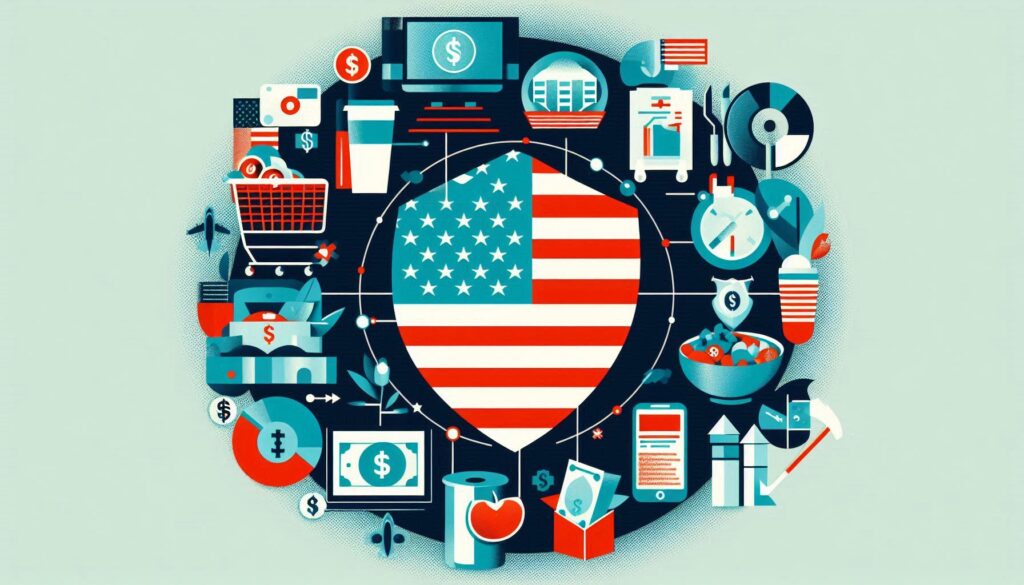Inflation has become a significant concern in the United States, affecting various aspects of daily life. As prices rise, consumers find themselves adjusting their spending habits to cope with the increased costs. Understanding the impact of inflation on consumer behavior is crucial for individuals looking to protect themselves financially and make informed decisions.
This blog post delves into the ways in which inflation influences consumer habits and provides practical tips on safeguarding your finances during these challenging economic times. Let’s explore the changes in consumer behavior in response to inflation and what can be done to mitigate its effects.
Understanding inflation and its effects on consumer behavior

Inflation is the rate at which the general level of prices for goods and services rises, leading to a decrease in purchasing power. As inflation increases, each dollar buys fewer goods and services, which significantly impacts consumer habits in the U.S. This erosion of purchasing power prompts individuals to modify their spending behavior to match their financial capabilities.
First, consumers often cut back on discretionary spending, focusing instead on necessities. This shift means that luxury items, dining out, and entertainment may take a backseat. As families prioritize essential purchases, industries that rely on discretionary spending may experience a downturn, affecting the broader economic landscape.
Secondly, inflation can result in reduced savings rates. As prices rise, households may find it challenging to allocate funds for savings, as more of their income goes toward covering daily expenses. This reduction in savings can have long-term implications, affecting individuals’ ability to build wealth and prepare for future financial needs.
The psychological impact of inflation on spending
The psychological impact of inflation can also lead to changes in consumer behavior. When individuals perceive a constant rise in prices, they may experience anxiety and uncertainty about their financial future. This anxiety can lead to a precautionary approach to spending, where people become more cautious with their money, further impacting the economy.
Moreover, the fear of continued price increases can drive consumers to make purchases sooner rather than later, fearing that waiting may lead to even higher costs. This behavior can create a self-fulfilling cycle, where increased demand contributes to further inflationary pressures, exacerbating the very issue consumers are trying to avoid.
Long-term effects on lifestyle and consumption patterns
Inflation’s influence extends beyond immediate spending adjustments and can alter long-term lifestyle and consumption patterns. As individuals become accustomed to higher prices, they may permanently change their purchasing habits, opting for more cost-effective options as part of their everyday routine.
For instance, consumers might shift towards a more frugal lifestyle, choosing home-cooked meals over dining out, and embracing sustainable and economical practices such as energy conservation and minimalism. These changes reflect a broader cultural shift, driven by the need to adapt to the new economic reality.
Strategies to protect yourself against inflation
With inflation impacting consumer habits, protecting oneself financially becomes imperative. Fortunately, there are strategies individuals can employ to safeguard their finances and mitigate the adverse effects of rising prices. These strategies focus on maximizing purchasing power and ensuring financial stability amid economic uncertainty.
First, creating a comprehensive budget that accounts for inflationary changes is crucial. By tracking expenses and identifying areas for cost-cutting, individuals can better manage their finances and prioritize essential spending. Regularly reviewing and adjusting the budget in response to market shifts ensures that it remains effective over time.
Additionally, building an emergency fund can provide a financial cushion during inflationary periods. By setting aside funds specifically for unforeseen expenses, individuals can avoid accumulating debt and maintain financial stability. Consider utilizing high-yield savings accounts to ensure that the funds retain their value over time, combating inflation’s eroding effects.
Investing wisely to combat inflation
Investing strategically is another way to protect against inflation. By allocating funds in assets known to appreciate over time, individuals can build wealth and preserve purchasing power. Stocks, real estate, and commodities are assets that tend to perform well during inflationary periods.
For those new to investing, it is advisable to diversify portfolios to minimize risk exposure. Diversification means spreading investments across different asset classes, which can help cushion financial impacts if one particular market segment declines. Consulting with a financial advisor can provide valuable insights and tailor an investment strategy that aligns with personal financial goals.
Furthermore, considering inflation-protected securities, such as Treasury Inflation-Protected Securities (TIPS), can ensure that investments maintain their real value. These securities are designed to increase in value with inflation, providing a reliable option for preserving wealth.
Adapting to economic changes
Adapting to economic changes is key in an inflationary environment. Flexibility and openness to adjusting financial habits can enhance resilience against economic fluctuations. By staying informed about market trends and consumer behavior, individuals can make proactive decisions that safeguard their financial well-being.
Embracing technological advancements can also contribute to adapting effectively. Utilizing apps and platforms that offer budgeting tools, price comparisons, and deal alerts can help consumers make informed purchasing decisions, ensuring they get the best value for their money.
